Warrior to Healer: Combat Marine to Music Therapist
By Mark Sauza, USMC (Ret)
*This is an article from the Winter 2021-2022 issue of Combat Stress
One of the most difficult decisions of my military career was coming to terms with Combat Stress. From that unforgettable moment at boot camp when we step on our infamous yellow footprints, we are ingrained with an ethos of Esprit de’ Corps, a sense of invincibility, and an adapt and overcome mindset. Learning the history of our fallen brothers fighting bloody battles on foreign beachheads, being dubbed the President’s Own, or just simply being called a “Jarhead” lifted my head and pumped my chest with the utmost of respect.
I thought to myself, “Marines are tougher than this, I am tougher than this!” Then how and why did I get here? How did I get on my office couch, laying here, staring at the ceiling, numb to the world? Literally, not giving a $h!+ about anyone or anything around me. A loud unintrusive knock on my door eventually sits me upright, I take a deep breath, hands on knees, stand up, and slide behind my desk and shout… “Come in!”
Coping with and identifying Combat Stress
What happened to the motivation and hustle that got me through 19 years of sacrifice? I was exhausted with helping others with “their” problems, I didn’t want to be at work, I didn’t want to be at home, wasn’t sleeping, was abusing alcohol. I was a toxic mess. Then I began to wonder if that very hustle got me to where I was that day. Sure, I could look around and see numerous thank you and job well-done plaques and accolades on the walls. But what was it all for? I was divorced, struggling to maintain a relationship with my children, all my relationships (family or social), were or had fallen apart. I was ineffective as a Marine leader, was alone, and lacked purpose.
I struggled with Combat Stress while on Active Duty for 14 years. I took a common path and masked my internal fires, thinking to myself that I had everything under control. I did what I had to and kept my head down. My performance at work was mediocre at best. In the spring of 2017, I had a serious bout with a .40 caliber Smith & Wesson and some suicidal ideations. A desperate phone call to a long-time Marine Brother of mine truly saved my life, I am forever indebted to him. Love you, Brother!
It was that very phone call that pushed me to own my mental health and take control of my alcoholism. While still on Active Duty, I openly expressed my struggles with Combat Stress to my Commanding Officer. Thankfully he was more than understanding and gave me the confidence to proceed with treatment. I no longer cared about the negative stigma associated with my mental health conditions. I proceeded to explore and take advantage of every program the military had to offer. This encompassed both Army and Navy PTSD/Substance Abuse, In-patient/Out-patient, Group Therapy, and Residential treatment facilities.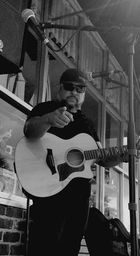
Clinical Treatment
I approached my Combat Stress treatment from every angle possible. I first established a good rapport with a primary Psychologist and Psychiatrist on base. This took a few attempts, but I did find the right doctors. As we all know, it is not easy to talk to someone about personal matters. The most difficult part is giving someone you barely know the key to your very own pandora’s box. I engaged in multiple group therapy sessions and Inpatient/Outpatient clinics. This was undoubtedly the toughest part of my journey. The unpacking of pandora’s box is brutal. As you open the box, you pull back the black satin sheet only to realize this large box is filled with a hundred smaller boxes. Every counseling session, whether it be one-on-one or group, pulled out another little black box to open and prepare for an ensuing battle.
For this exact reason, I quickly became averse to Group Therapy sessions. Group Therapy sessions work, hands down, so I am not discounting them. I experienced professional programs that ran effectively and efficiently on both Army and Marine Corps/Navy Installations. My distaste for “group” is the inherent collateral damage group members take on when hearing another’s tragic story or situation. This damage happens to other members of the group, whether it be crossfire or adjacent; it does not matter, someone gets hit. As I listened to the group members tell their stories, I would slowly drift into a trance. Trying to stay engaged in a group session after hearing another’s story (unfortunately or fortunately, depending on how you look at it) would remind me of a difficult experience from my past, an experience I may not have been ready to confront.
Having walked this road, I wondered if there must be an alternative controlled descent. These black boxes cannot just be shut when opened. Once they are open, they are wide open, especially when kicked open (listening to another’s story that triggers a memory). Every box may be as important as the next, simply because of the unknown content.
Now let us compound this emotional rollercoaster with pharmaceuticals. At this point, my doctors and I were still navigating our way through the tricky waters of SNRI’s/SSRI’s to treat my conditions. Dosages were slowly increased, but the problem was having to wait 2-4 weeks, sometimes longer, to see if there was a positive or negative effect. Having run the gamut of SNRI/SSRI cocktails, I will say this. They work for some, not so much for others, and the side effects from ALL of them are real, very real. So real the adverse side effects of SNRI’s practically annihilate testosterone levels and cease any kind of sexual activity. This is devastating to alpha personality types. “Now I have to take this “Blue” pill because I take those other meds? Roger that Doc, whatever we have to do to get this $h!+ show rolling again.”
 I was ambushed by the disarray of my past memories before me. My mind kicked into hyperdrive: reliving, smelling, feeling those same emotions, sights, and sounds from over a decade ago. However, my medications were stuck in 1st gear as I waited out the exposure period.
I was ambushed by the disarray of my past memories before me. My mind kicked into hyperdrive: reliving, smelling, feeling those same emotions, sights, and sounds from over a decade ago. However, my medications were stuck in 1st gear as I waited out the exposure period.
Something needed to stop the demons in my head, and it needed to stop them now! ATTENTION: Stage left entrance: Mr. Alcohol. Due to low dosages and exposure periods, I quickly turned to another source of “medication.” Fueling a family history of substance abuse, I rapidly spiraled out of control. I was not the type of alcoholic that needed a drink upon waking, nor was I that alcoholic that drank at work. Instead, I was the guy that couldn’t stop once started, full throttle or no throttle. My consumption rate would either end in passing out, blacking out, or running out (drinking myself sober). Over the years I have burnt many bridges due to my alcoholism. To all of those bridge owners, I openly and sympathetically apologize to you now! I feel the combination of the unpacked boxes, low medication dosages, and high levels of alcohol brewed the perfect storm for me that spring night of 2017, the night I called my dear friend.
I took a lot of information away from my Inpatient/Outpatient programs and felt they were extremely beneficial. However, clinicians must be particularly careful while treating and medicating Service Members and Veterans. These clients need to be prepared mentally and physically for their healing journeys and determining combat Veterans’ readiness to face demons can be extremely difficult. Developing rapport and trust with patience and compassion opens dialogue and encourages communication. Clinicians need to use our education, experiences, and clinical gut to determine each patient’s next step. If we listen closely, our patients will tell us when they are ready.
After completing a few different Army programs at Inpatient/Outpatient clinics. I turned to a nearby Marine Corps installation to see what they had to offer for treatment. Again, I was greeted with professionalism and respect. My counselor was a retired Navy Sailor. Who better to counsel Marines and Sailors than an old salt dog sailor troublemaker (at least that is what I gathered from his stories)? He was sincere and genuine, and I liked that. After a handful of counseling sessions, he invited me to speak to his younger Marines who were enrolled in command-directed substance abuse programs. I was reluctant at first but quickly realized the benefit of my presence. It felt good to help Marines again.
In May of 2017, the Navy counselor recommended a Residential Behavioral Health Clinic in South Florida to me. “Fancy word for rehab,” I cracked at him. He knew what I needed. He knew I was not going to fully open up unless I had someone’s attention 24/7. He was right: I feared getting anywhere near those black boxes. Here I would be treated for both Combat Stress and alcoholism, plus be under constant supervision. I was all in.
Discovery of Music Therapy
A couple of weeks into residential treatment I noticed “Expressive Therapy” listed on the daily schedule pinned to the wall next to the nurse’s station. Prior to this, I had not heard of “Music Therapy” in a clinical sense. I was politely educated by one of the staff nurses that “A Music Therapist (MT) would come in and play music for us.” Other than that, she was not sure what our time would entail. I thought it was an intriguing idea but did not know what to expect.
Looking back, I can now identify two different techniques utilized by our MT: Lyrical Song Analysis with recorded music, and Improvisation with Songwriting. After our session, I asked the Music Therapist some quick questions about her profession. The following week she handed me a packet of information about the Music Therapy Degree along with a list of schools that offered the program. I thanked her for the information and honestly put the idea on the back burner. Music Therapy was an interesting thought, but I really did not see how it pertained to me.
A few days later, still in residential treatment. I attempted to write down some thoughts (homework) in anticipation of an upcoming one-on-one counseling session. Completely unexpected to me, my struggles seamlessly transferred to paper that night. At this point, I had seen 6 different counselors over the past year and a half, each of whom tasked me to write down my “Initial Trauma” (defined in their eyes as that moment in time when I knew my experiences had changed me). Pardon me, say again? You do realize I have at least 100 of those incidents, right? After many attempts, with many different counselors, I could not complete this task. I guess the apparent fear of revisiting any of those events felt way too sketchy. Abort had become my mission.
The following day I met with my counselor. She was a retired Master Sergeant from the Air Force who helped me peel back some nasty layers and realize some hard truths about myself. Without her guidance, I would not be where I am today, so I thank her deeply. After some daily greetings, I gave my counselor the sheet of paper from the night before. She was ecstatic about my breakthrough. Not only did I identify some tangible issues with my Combat Stress, but I also found a vessel that would allow me to communicate what I could not otherwise express directly. I had written a song and titled it “Hollow Tears.” “Hollow Tears” has a minor tonality (sad or dark sounding) with aggressive lyrics that speak to the perspective of the ongoing battles within a Combat Veteran’s mind. The lyrics speak to knowing that we as Warriors are twisted up inside. Twisted about the price of freedom, constant struggle with guilt, sacrifices made, invisible injuries, knowing we drink too much, fight too much, etc. The tears of a deeply wounded Warrior appear hollow to our family and friends. Our inability to convey emotions leaves those closest to us feeling confused and helpless. Helpless, as they witness unexplained tears leaking from our faces.
I smile as I picture the two entry-level guitars with rusted strings hanging behind the nurse’s station. I do not come from a musical background. I have never been in band class and the only person in my family who plays an instrument is my grandfather, who is an 84-year-old Vietnam Veteran whom I love and respect dearly. I remember as a child seeing him play music with his friends at one of his many cookouts or hog roasts, but he never sat me down and said, “Boy this is how you hold a guitar and make a D chord…now strum.” I was at that point self-taught, with no formal lessons. I had played the guitar off and on throughout my military career. I would play for a year or two then put the guitar down and not touch it for another 2 years. I believe the longest was 4 years between bouts of playing. I even recall a couple of deployments where I was handed a guitar as a passing Marine boarded a helo finishing his tour of duty. I could play a few chords and sing a couple of songs but that was it.
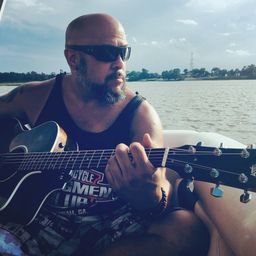 Finding a new mission
Finding a new mission
A few days after handing my counselor the lyrics to “Hollow Tears,” a fellow patient (Army Major) and I were playing the guitars in the courtyard during some supervised free time. Our inpatient treatment facility was in the shape of a pentagon, having five wings with a grassy courtyard in the middle. Each wing had its own designation, e.g., Wing #1 Adolescent Children, Wing #2 Older Adult, etc. My wing was strictly active-duty military. Normal operating procedures did not allow any two wings to be in the courtyard simultaneously. However, this day was different. Our group was in the courtyard enjoying some fresh air and the warm Florida sun. The Major and I were sitting at picnic tables in a shaded area near the entrance to an adjacent wing, picking and grinning away on the guitars. About 15 minutes before our “Free time” ended, the automatic doors next to the picnic tables opened. The Major and I took a glance and quickly identified patients emerging as a much older group than ours. As we were in the largest shaded area, we decided to move to allow the older patients a place to sit in the shade. With our guitars in hand, we began to walk to the other side of the courtyard, when an older gentlemen’s raspy voice yelled out, “Can you play that thing?” The Major and I both turned around and I acknowledged, “We can pick a little, any particular song you want to hear, Sir?” He quickly belted out, “How about some Johnny Cash?” I was relieved with his song choice because it was one of 3 songs I could remember at the time. “As a matter of fact, we were just playing one,” I replied. The Major and I began to strum up our version of Mr. Cash’s “Ring of Fire.” At first, about 3 or 4 patients were listening to us. I noticed an increasing number of patients gathering around us as another patient from the back corner of the picnic tables yelled out another song title. Unfortunately, I did not know the requested song but strummed up another tune from the same genre.
As I began to play, I faded into the song. Somewhere between me trying to keep the rusty strings from breaking and remembering the lyrics to the song, I noticed not only patients but now staff gathered around our picnic table. I was blown away as I looked up and saw about 20 people swaying and bopping their heads to the music. All I could think about was how each of us (staff and patients) came from different experiences, ethnic groups, and upbringings. As I made eye contact with the crowd it hit me like a battleship pounding a beachhead: it was the music. No matter the life problems or medical diagnoses, the music took us to a place where nothing else mattered but that moment. I witnessed the medicine of Music Therapy that day and at that exact moment, I knew what my next mission was, it was to become a Music Therapist. I was awestruck by what I had just experienced. I knew, without a doubt, my next mission was to share this experience with as many Veterans as possible. As I finished the song, we were called in for chow. We exchanged some quick goodbyes and good lucks and went inside. There was an indescribable weight lifted from my shoulders. That was the day I found my new mission. I had a purpose!
At the first opportunity available, I signed up to use the one and only computer accessible to patients on our wing. I sat down and quickly ruffled through the literature given to me by the facility’s resident MT. I found a list of universities that offer Music Therapy degrees. To my surprise, Charleston Southern University, located in Charleston, South Carolina, was on the list. “Shut up, No way!” I thought to myself, “That’s only an hour away.” I pulled up CSU’s main webpage, found that it accepts the G.I. Bill, and participates in the Yellow Ribbon Program. I pasted some web links and emailed them to myself, as I still had a few weeks of treatment left before I was released. I completed the residential treatment program in South Florida in the summer of 2017.
Songwriting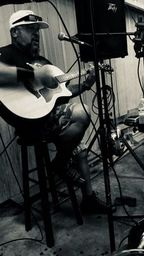
Since discovering therapeutic songwriting, I have written 12 songs, mostly dealing with Combat Stress and military sacrifice. I eventually backtracked and wrote a song about my battle with those suicidal ideations, titled “May the Best Man Win.” I find songwriting in this atmosphere to be extremely challenging yet medicinal in nature. My challenges do not lie so much in finding lyrics or melodies to accompany the testimonies. Instead, my primary focus is to create a safe haven where I can control the environment, free my emotions and quickly get back to a place of refuge if needed. Writing music is my new medicine. I write for self-healing, direction, and scope. The process is deeply emotional; it hurts to write, perform, or even discuss the content of my music. That probably explains why I have only written a small number of songs in comparison to other singer/songwriters’ catalogs. I continued weekly counseling sessions with my therapists until I officially retired from the USMC in the summer of 2018.
Forging Ahead
Upon retiring, I still had not fully researched CSU’s Music Therapy program. The mindset I had approaching school was simple: I will get a little music training and probably a lot of therapy training. After four years of school, Hokus Pokus, I’ll be a Music Therapist. I accepted the daily 1-hour, one-way commute, even though I had not yet made the drive to campus. I would have class Mon-Fri starting at 0800 and be home by 1600 every day, drive included. I was a 43-year-old Veteran student who would be cranking out a full-time credit semester. I was so confident in my decision to become a Music Therapist that I barely screened the program requirements. I basically enrolled in the CSU Music Therapy program and showed up.
August 2018, CSU, Orientation Day or Music Boot Camp Day #1, as I refer to it: I receive an email notification that there is a mandatory meeting for all students of the Horton School of Music. Ok, I guess that means me? School of Music? What’s that about? I was oblivious to the structure and function of Schools of Music within university systems. Regardless, I showed up to the designated room 15 minutes early, backpack in hand, and sat somewhere in the middle, back row. Being early, I expected a few people to be in the room. What I did not expect was to be the only one in the room less than 10 mins to presentation time. I sat there beginning to wonder if I was in the wrong place. Oh wait, there’s a group of kids. Ok, that looks like a professor. Yes, I must be in the right spot. I settle in and wait for the presentation to begin. As the room fills up, I scan the room and suddenly realize that I am surrounded by 18- and 19-year-old men and women (freshmen students). I also realize that I was that gnarly looking, long-bearded, Veteran student sitting in the back of the room with tattoos and his arms crossed.
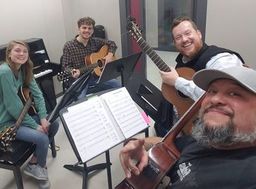 Out of place was an understatement, but oddly I did not feel out of place. I uncrossed my arms and tried to smile. As the presentation began, a loud voice came over the microphone. “Good afternoon, I am the Director of the Horton School of Music (HSM) and I would like to welcome all of you. Oh, apologies, you are not yet officially accepted into the School of Music; you are on probation pending acceptance into the HSM. After this fall semester, I along with the other HSM faculty members will review each one of your files individually and determine if you have met HSM acceptance criteria. We will be evaluating each of you on characteristics such as, but not limited to, work ethic, GPA, musical potential, and ability to work with others.” When he mentioned acceptance criteria and mandatory probationary status, I thought to myself, man these guys are not messing around. What in the world did I get myself into? As the Director continued, I could see at least 12 other professors sitting on the stage.
Out of place was an understatement, but oddly I did not feel out of place. I uncrossed my arms and tried to smile. As the presentation began, a loud voice came over the microphone. “Good afternoon, I am the Director of the Horton School of Music (HSM) and I would like to welcome all of you. Oh, apologies, you are not yet officially accepted into the School of Music; you are on probation pending acceptance into the HSM. After this fall semester, I along with the other HSM faculty members will review each one of your files individually and determine if you have met HSM acceptance criteria. We will be evaluating each of you on characteristics such as, but not limited to, work ethic, GPA, musical potential, and ability to work with others.” When he mentioned acceptance criteria and mandatory probationary status, I thought to myself, man these guys are not messing around. What in the world did I get myself into? As the Director continued, I could see at least 12 other professors sitting on the stage.
After his brief introduction, the Director began introducing the professors. Taking turns, each professor told us their name and their role at the HSM. As the introductions continued, I realized there were numerous degrees that fell under a bachelor’s degree in music. Music Therapy, Music Worship and Leadership, Music Education, Choral Education, Music Performance, etc. The realization of achieving a classical music degree was beyond me. I had NO classical music influences or prior experience, I could not read music, nor could I play the piano. Simply put, classical music was a foreign language to me. Ultimately, it did not matter because I was dead set on becoming a Music Therapist, marching on.
The Mission Continues
On the first day of Musicianship class (a sequence of four classes that every music student must pass, consisting of Music Theory, Aural Skills, and Dictation), I was given a music theory placement exam. It was about 4 or 5 pages long. I presume the questions became more complex as you plowed through the test. I flipped through the pages, instantly realizing I couldn’t answer a single question. I scribbled my name and student ID in the top right corner and turned in my blank exam. The professor conducting the assessment asked me if I was serious. I told him that I was dead serious, that I had no prior musical training, but I was trainable. He said, “We’ll see.” Affirming that I was definitely out of my league.
I will admit the last 3 years of school have been brutal, with exceptionally longer hours than expected. The last class of my first semester ended at 1830 Mon-Thurs. Due to my lack of Music Theory knowledge, I scheduled tutors twice a week. On average I was not leaving campus until 2200, often burning the night away in the Veterans lounge or the University Library until closing time. My official commute from my driveway to campus was an hour and 30 minutes one way, not the hour I had initially anticipated. I also discovered the Music Therapy degree was a 5-year program with 1,200 required in-school clinical hours and a 6-month internship.
I am now entering my 4th year of studies as a Music Therapy student. I have since completed the musicianship sequence. I have achieved Vocal and Guitar proficiency. I have sung in the Men’s Choir, and I have been a part of the HSM Guitar Ensemble for the past 2 ½ years. I am continuing to study piano with aspirations of achieving proficiency in the Spring of 2021. I have also observed or participated in Music Therapy clinical sessions with special needs children, adult psychiatric, and dementia patients. In the Spring of 2019, I worked with Challenge America (a non-profit Veterans foundation based out of Colorado) at a Veterans songwriting clinic in Nashville, TN. Here Music Therapists, Nashville songwriters, and Veterans were teamed up at Vince Gill and Amy Grant’s 450-acre ranch. Each team was given a day and a half to venture into the woods and write a song inspired by the Veteran. On the 2nd day, Amy Grant’s sound crew set up a small stage and we performed the songs we had written for the Veterans’ families and friends. Dallas and his team at Challenge America are true professionals with a solid mission, it was an amazing experience.
End Goals
I have chosen to pursue an optional minor in Psychology along with my Music Therapy degree. With that, I have 4 semesters of school remaining before I am eligible for an internship. One of my many short-term goals is to establish a network between the local Veterans Affairs Medical Center and the University. The Veteran population is the only group we do not have access to as Charleston Southern Music Therapy Students. Allowing our students to conduct clinical work with Veterans on a consistent basis will be invaluable to both programs. This could potentially lead to internships or permanent Music Therapy positions at the VAMC.
 Once I am board-certified, my focus will be lyrical song analysis through songwriting with Combat Veterans suffering from PTSD. I intend to work with Music Therapy Associations and Veteran Foundations to serve as a walking example that the power of Music Therapy is real. I want to help educate and train future Music Therapists on how to best serve Veterans.
Once I am board-certified, my focus will be lyrical song analysis through songwriting with Combat Veterans suffering from PTSD. I intend to work with Music Therapy Associations and Veteran Foundations to serve as a walking example that the power of Music Therapy is real. I want to help educate and train future Music Therapists on how to best serve Veterans.
Having walked the road of alcoholism, clinical treatment, pharmaceuticals, suicidal ideations, and Combat Stress. I hope to bridge the gap between clinician and patient. I am currently 4 ½ years alcohol-free and I am off every pharmaceutical medication prescribed to me 4 years ago. We all have an organic pressure release, and I believe the key to that valve is music. I want to teach others how to restock their medicine cabinet with musical interventions, meditative practices, and expressive therapy techniques. I will promote the medicine of music and show the world there is a Music Therapist hidden within all of us.
Special Acknowledgments
My academic progression would not be where it is today without the guidance and mentorship of two professors at CSU. Dr. Jennifer Whipple is the Universities Director of Music Therapy and my Academic Advisor. She has been my captain, steering me through this entire academic process. Her family’s military background gives her great insight and the ability to effectively communicate with Veterans. Dr. Whipple, your knowledge and dedication to your profession is deeply admired. Thank you for being one of my pillars and guiding me through this process!
Dr. Dustin Ousley is the Universities Director of Choral Activities. Dr. O. was my primary instructor throughout my musicianship sequence. I have observed him in choral, one-on-one, and classroom environments. As a career Marine and a certified instructor trainer, I have spent countless hours on platforms instructing civilians and Marines. When I say that Dr. Ousley is the best educator I have ever witnessed, my assessment comes with grit and experience. His thirst for teaching is second to none. Coupled with his tremendous talent, he sets an example for all professional classical musicians to emulate. He is truly a subject matter expert who can demonstrate and make on-the-spot corrections quickly and accurately. Dr. O., thank you for your relentless devotion to music education. I would not be where I am today without you.
More about Music Therapy
Charleston Southern University, Music Therapy Program
https://www.charlestonsouthern.edu/academics/horton-school-of-music/music-therapy/
American Music Therapy Association (AMTA) is a 501(c)3 non-profit organization whose mission is to advance public awareness of the benefits of music therapy and increase access to quality music therapy services in a rapidly changing world. https://www.musictherapy.org/
Challenge America is a 501(c)3 organization whose mission is to connect Service members, Veterans, and their families to resources and solutions that build community and give purpose to their lives. https://www.challengeamerica.com/
Hollow Tears
Mark Sauza
What excuse will I use today?
To have drink and wash it all away
I don’t have a problem, I don’t need to quit
There’s demons in my head and I’m sick of this shit……
I self-medicate to cover my worn torn eyes
Been through situations done something’s that I despise
Guilty for my actions, bottled deep down inside
Pandora’s box compartmentalized
I know, I know, you know, I don’t talk about all my fears
I know… I never get back those years
I know, I know, you know, I won’t talk about all my fears
That’s what it’s like living through these Hollow Tears
Intoxication to a point of no return
Passout…….Blackout……will I ever learn?
Existing in shadows consumed by shame
Stumbling through life is no way to play the game
Lying to myself has become the norm
Justification for my alcoholic storm
Day to day I cover-up the truth within
How can I live a life filled with sorrow and sin
I know, I know, you know, I don’t talk about all my fears
Because I never get past those years
I know, I know, you know, I won’t talk about all my fears
That’s what it’s like loving a man with Hollow Tears
I know, I know, you know, I won’t talk about all my fears
That’s what it’s like loving a man with Hollow Tears
© 2021
ABOUT THE AUTHOR
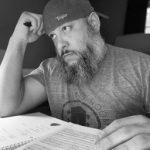
Mark Sauza, United States Marine Corps, First Sergeant (Ret) is currently in his 4th year of study at Charleston Southern University (CSU) in Charleston, SC pursuing a degree in Music Therapy. Mark’s intentions are to highlight and stand as an example of the benefits that Music Therapy can provide for Veterans. His primary focus will be utilizing lyrical analysis and songwriting to help Veterans explore compartmentalized experiences from their past.
Mark is a retired Marine with 21 years of service. His military occupational skill was a M1A1 Tank Crewman (1812). He was a Platoon Sergeant/Tank Commander for 3 Combat Tours in Iraq with 1st Tank Battalion. Falluja 2004, Haditha Dam 2005-2006, and Northern Al Anbar Province 2007 with the 13th Marine Expeditionary Unit. In 2012 he completed a successful tour of duty as a Drill Instructor at Parris Island, SC. In June of 2012 he deployed to Helmond Province, Afghanistan for his 4th and final deployment with 2nd Tank Battalion. He was promoted to his current rank in 2013. He retired from the USMC in June of 2018 and began his professional Music Therapy journey in the Fall of 2018 at CSU.
Mark was awarded the Navy and Marine Accommodation Medal with Combat Valor distinguishing device for his actions in Fallujah, he was also awarded the Navy and Marine Corps Achievement medal with Combat Valor device for his actions in the Haditha Triad in 2006. During his deployment in 2007, he was wounded by enemy sniper fire and subsequently received the Purple Heart medal. Above all Mark’s accomplishments, he is the proudest of his two sons, Hunter and Kadin.
Combat Stress Magazine
Combat Stress magazine is written with our military Service Members, Veterans, first responders, and their families in mind. We want all of our members and guests to find contentment in their lives by learning about stress management and finding what works best for each of them. Stress is unavoidable and comes in many shapes and sizes. It can even be considered a part of who we are. Being in a state of peaceful happiness may seem like a lofty goal but harnessing your stress in a positive way makes it obtainable. Serving in the military or being a police officer, firefighter or paramedic brings unique challenges and some extraordinarily bad days. The American Institute of Stress is dedicated to helping you, our Heroes and their families, cope with and heal your mind and body from the stress associated with your careers and sacrifices.

Leave A Comment
You must be logged in to post a comment.